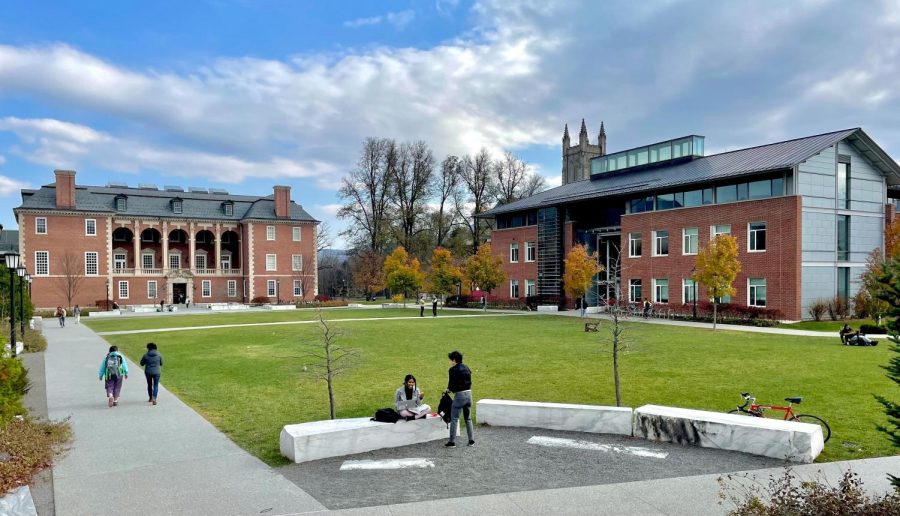Professors submit proposal for Asian American studies program
November 10, 2021

Associate Professor of American Studies Jan Padios and Chair of American Studies Dorothy Wang submitted a prospectus to create an Asian American studies (AAS) program to President Maud S. Mandel, Provost Dukes Love, Dean of the Faculty Safa Zaki, and Chair of the Committee of Educational Affairs (CEA) Cathy Johnson last Sunday. The prospectus details the steps the College should take to establish a viable AAS program and is the latest push for AAS after nearly three decades of activism.
Most recently, students and faculty called on the College to create an AAS program in light of a national uptick in anti-Asian hate crimes following the onset of the COVID-19 pandemic. Student activism also pushed the College to hire Padios as its third senior Asian Americanist in February 2020 — though courses that cover AAS content remain scattered across several departments, such as American studies and English.
If approved, the prospectus will centralize AAS in its own department and hire two new faculty members — one junior and one senior — both with Full Time Equivalents (FTE) solely in AAS. FTE is a measure used by colleges and universities to determine professor course loads. At the College, 100 percent FTE means teaching two courses per semester, with reductions available for department chairs and other special circumstances.
Currently, only three senior faculty members teach AAS classes — Wang, Padios, and Professor of History Scott Wong, who will retire at the end of the academic year. The remaining faculty who have regularly taught AAS courses have teaching and administrative obligations to their home departments that make it difficult for them to regularly offer AAS courses, according to the prospectus. It also notes that since AAS is not these other professors’ main focus, their curricula do not always fit into a cohesive AAS course progression.
Wang, who has long advocated for the establishment of AAS at the College, stressed that the two additional faculty members requested in the prospectus are necessary to run a formal AAS program. “This is not us asking for extra stuff,” she said in an interview with the Record. “This is just the bare minimum that we need to even start the program.”
The prospectus is the beginning of a longer process to establish AAS at the College, which will entail review and approval by the CEA and Committee on Appointments and Promotions (CAP), as well as a vote by the faculty at large. The administration must also approve the simultaneous hiring of new faculty and formation of a new academic program. “As with any such prospectus, we will discuss this in the appropriate committees,” Mandel wrote to the Record. “I look forward to the conversations to come.”
Padios said that the prospectus grew out of increasing demand from the College community for an AAS program and that it is meant to push the College to make concrete strides toward establishing a program. She highlighted previous statements by Mandel and the Office of Institutional Diversity, Equity, and Inclusion (OIDEI) that have publicly committed to supporting Asian American members of the College community.
“The demand for an Asian American studies program at Williams keeps getting stronger, and the prospectus is meant to reflect that,” Padios wrote in an email to the Record. “The prospectus recognizes that President Mandel, along with leaders of OIDEI, have publicly stated their support for Asian American students and studies, and asks that the administration’s support materialize in the form of new hires for an Asian American studies program.”
In addition to Padios and Wang, many past and current students have been pushing the College towards the AAS concentration; much activism has come from Asian American Studies in Action (AASiA). AASiA co-chair Rachel Jiang ’23 emphasized the importance of the prospectus in an email to the Record, noting that it is “the first piece of writing that demands a ‘yes’ or ‘no’ from the administration.” Jiang also wrote that “if the administration does not agree to this prospectus, it is unlikely that an AAS concentration will be a reality for another 5-6 years considering leave patterns and hiring cycles.”
Former AASiA co-chair Tyler Tsay ’19 stressed the importance of sustained alum involvement in the movement. “The number of alumni across generations in support of this program demonstrates the decades-long demand for the program, and they are ready to help the current faculty and students in any way they can,” he said.
Padios said she feels hopeful about the prospectus, and emphasized the role that her colleagues in other departments played in formulating it. She also pointed to the decades of student activism that have made this latest push possible.
“Colleagues in AMST, LATS, WGSS, and Africana Studies have been very generous with their time and institutional knowledge, students have been very engaged, and alumni have been organized and active,” she wrote. “I feel positively about the prospectus Prof. Wang and I have presented and hope the administration authorizes more hires, since it’s the right thing to do.”
Correction: A previous version of this article incorrectly stated that Jan Padios wrote the prospectus. Padios drafted the prospectus jointly with Wang and other faculty members, with input from alums.







